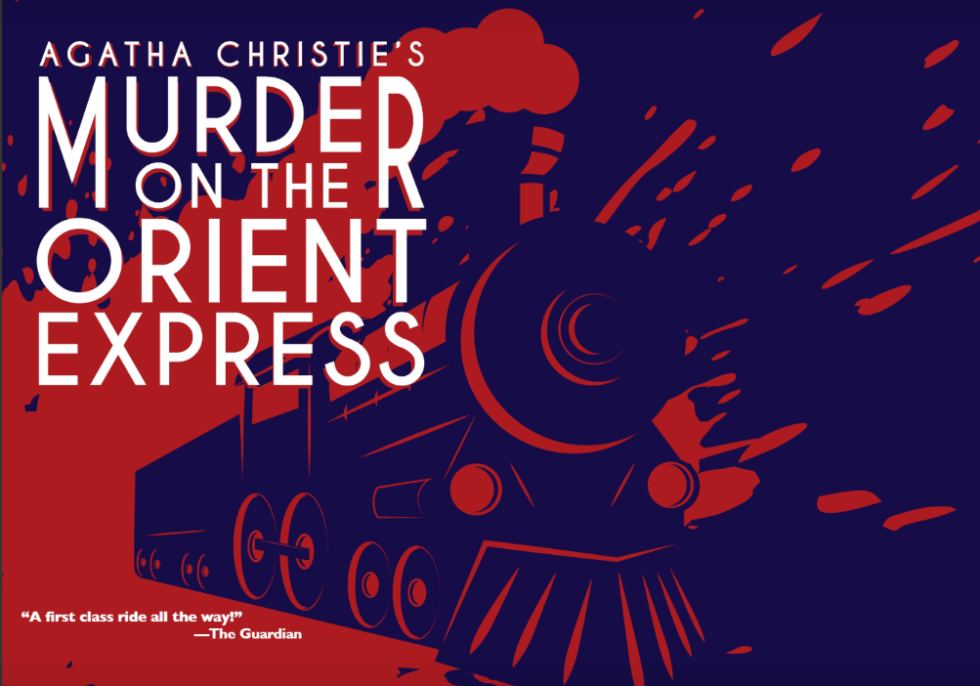
“There are precious few at ease with moral ambiguities…”
– Stephen Schwartz, Wicked
This is an often-retold story. The tale (retold by Ken Ludwig) is a tightly paced extended memory (or narrative) told by Christie’s famous Belgian detective Hercule Poirot. In Ludwig’s hands, the “whodunit” becomes mingled with the tougher question “who is in the right?”
In Dame Christie’s stories, we are not asked to like the victim. You really dislike the victim in this production long before they meet their demise. And that’s okay, he’ll only be on the stage alive for fifteen minutes or so. Heh-heh. We really get irritated by Samuel Ratchett (well and irritatingly played by MO Oberle) who seems to have no redeeming qualities and treats everyone around shabbily. Appropriate screams and cries greet the discovery of his body, stabbed eight times from several different angles. How many of them are real, though?
He obviously has a secret. All the characters have secrets. So many secrets. Poirot’s job is not only to find them all out but to decide what his personal role is in deciding justice. He is investigator, judge, and jury in the play. What will he decide?
As Poirot, Seth Drenning portrays the detective’s famous finicky mannerisms well. His Belgian dialect is clear but still allows the actor’s inflection to express strong emotion as well as his worldly sarcastic sense of humor. Ludwig and Drenning bring a lightly comic touch to the performance – almost like a musical.
This was part of senior student Drenning’s assignments in UMW’s Senior Project class, as with most of the other major characters. All present tight, clear performances with textbook dialect work and physical precision.
These include Monsieur Bouc (Niko Salinas), as Poirot’s French comic foil. He fully deserves the laughs he gets. Emma Magner plays Greta Ohlsson, a missionary nurse who is too Germanicly sweet to be true; Maddie Baylor plays Helen Hubbard broadly and hilariously. Her smile is that of a hungry cougar overlaid with a manic Minnesotan goofiness. Colonel Arbuthnot is a steadfast Scot of military bearing and intensity played by Mason Michael Clark; James Shepherd’s French Head Waiter brings a dancer’s physique and French snobbery to the opening scene.
This is an ensemble show with an ensemble cast. Mary Debenham, played by Peyton McCarthy, is joyfully British, although the buoyancy hides a nervous intensity. Cameron Zekreski’s Hector MacQueen is Ratchett’s intense factotum; Michel the Conductor brings us Blaise Wingold’s comic chops and a surprisingly sympathetic turn. Mary Devenham as the Colonel’s married paramour and Cora Denny’s Princess Dragomiroff were all equally effective in roles built specifically to confuse Christie’s master detective. Countess Andrenyi (Emily Kile), provides a beautiful and impossibly accomplished partner in investigation to Poirot.
But none of them are to be trusted – and not only as murder suspects. It still leaves us with the only question: given the choice that faces Poirot in the end, which choice serves justice best?
Let’s take a moment to praise the design and technical staff for the production. If the actors presented their roles with precision and artistry, the four people who turned the stage-filling set in full view of the audience and then faded immediately into the darkness were effective magicians’ assistants.
The design itself was simple and elegant. Every surface was treated, shined, polished, and presented with understated mid-thirties style. Costumes were created and used beautifully (when a perfect sleeve must be cut from period blouse to treat an injured arm, every cut of the scissors made my producer’s brain cry out in pain). Shoes, hair, and properties were well made, in period, and as fun as all of the performances. The lighting made magic happen, timing on lights and sound were just where they had to be. Critics are taught to notice the out-of-place; there was nothing.
My only regret is having seen the show on its second weekend: I’m not able to use this review as a tool to bring more audience members in to see this gem. However, since there were almost no empty seats on September 29, I doubt my efforts were needed.
Dennis Wemm is a retired professor of theatre and communication, having taught and led both departments at Glenville State College for 34 years. In his off time he was president and sometimes Executive Director of the West Virginia Theatre Conference, secretary and president of the Southeastern Theatre Conference, and generally enjoyed a life in theatre.





